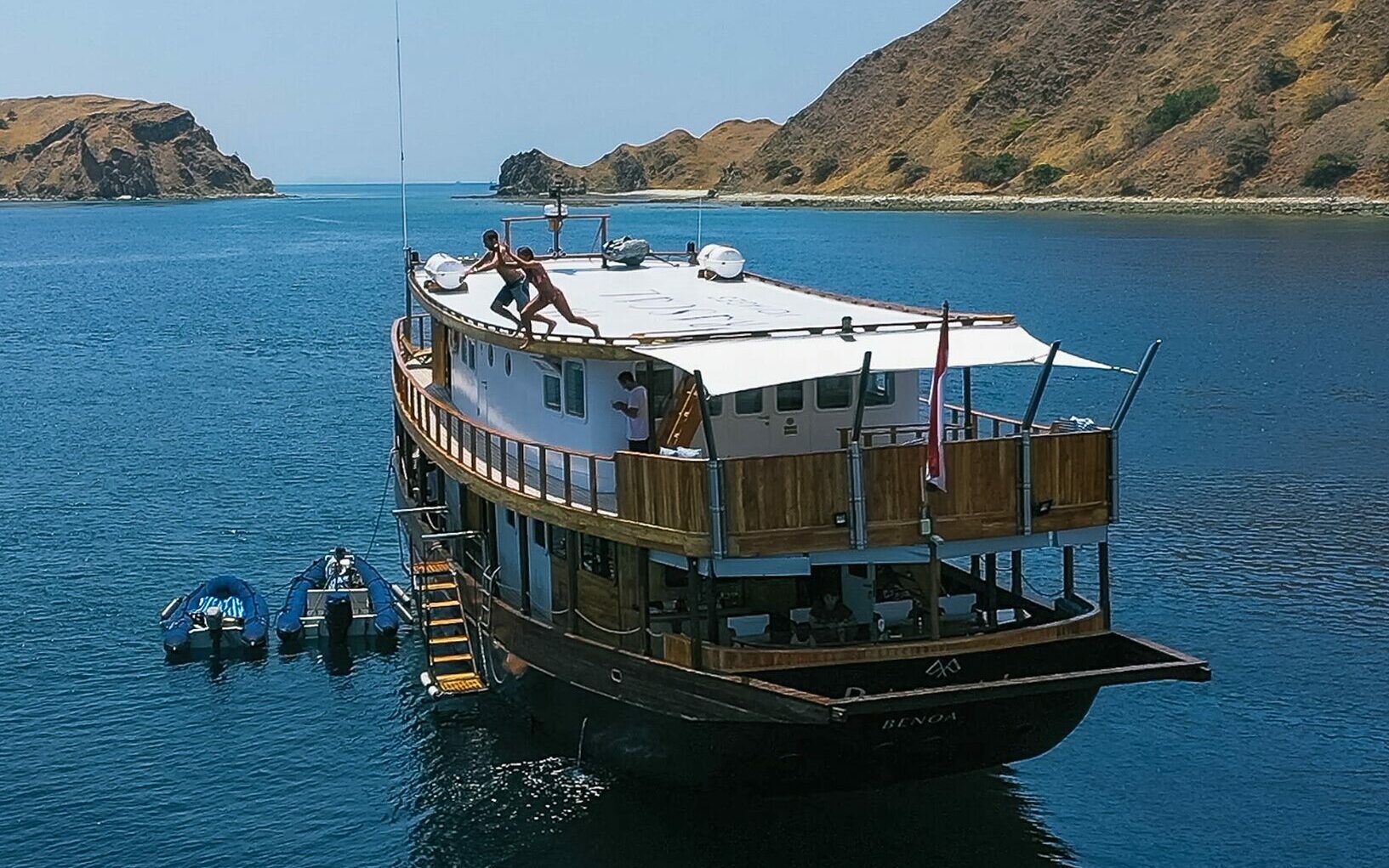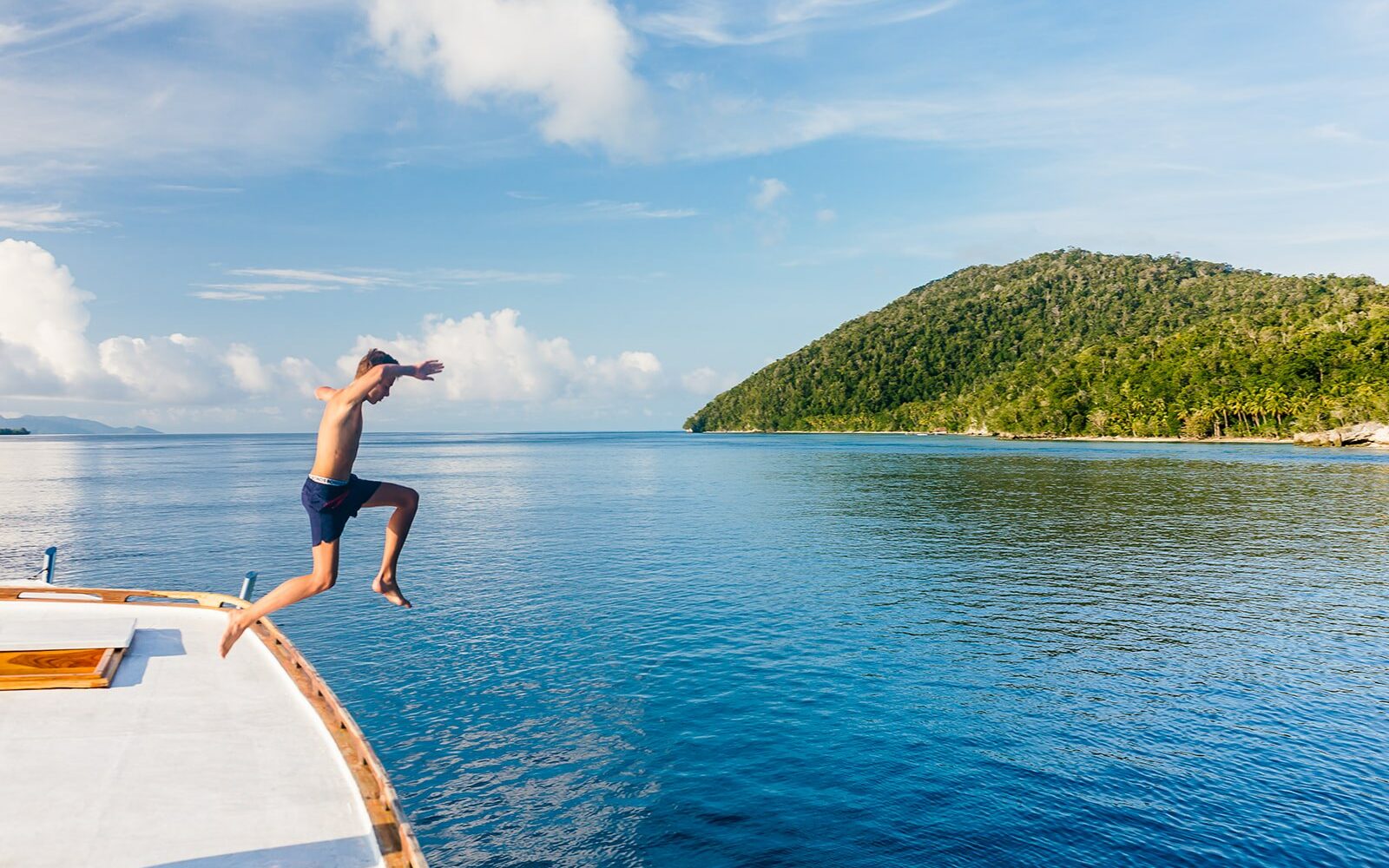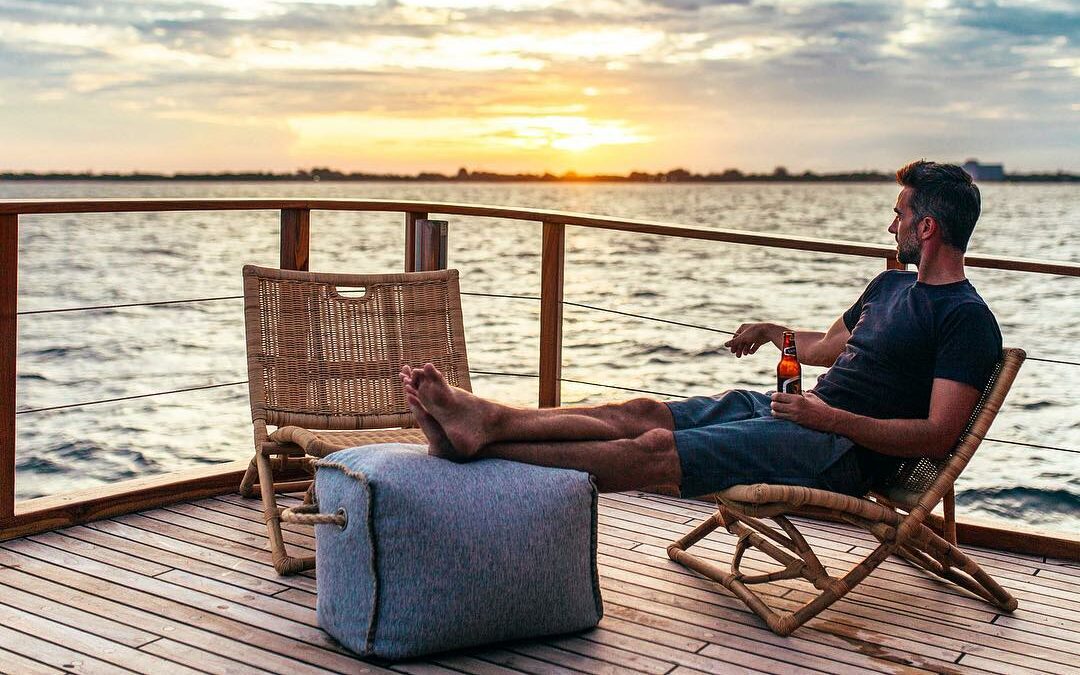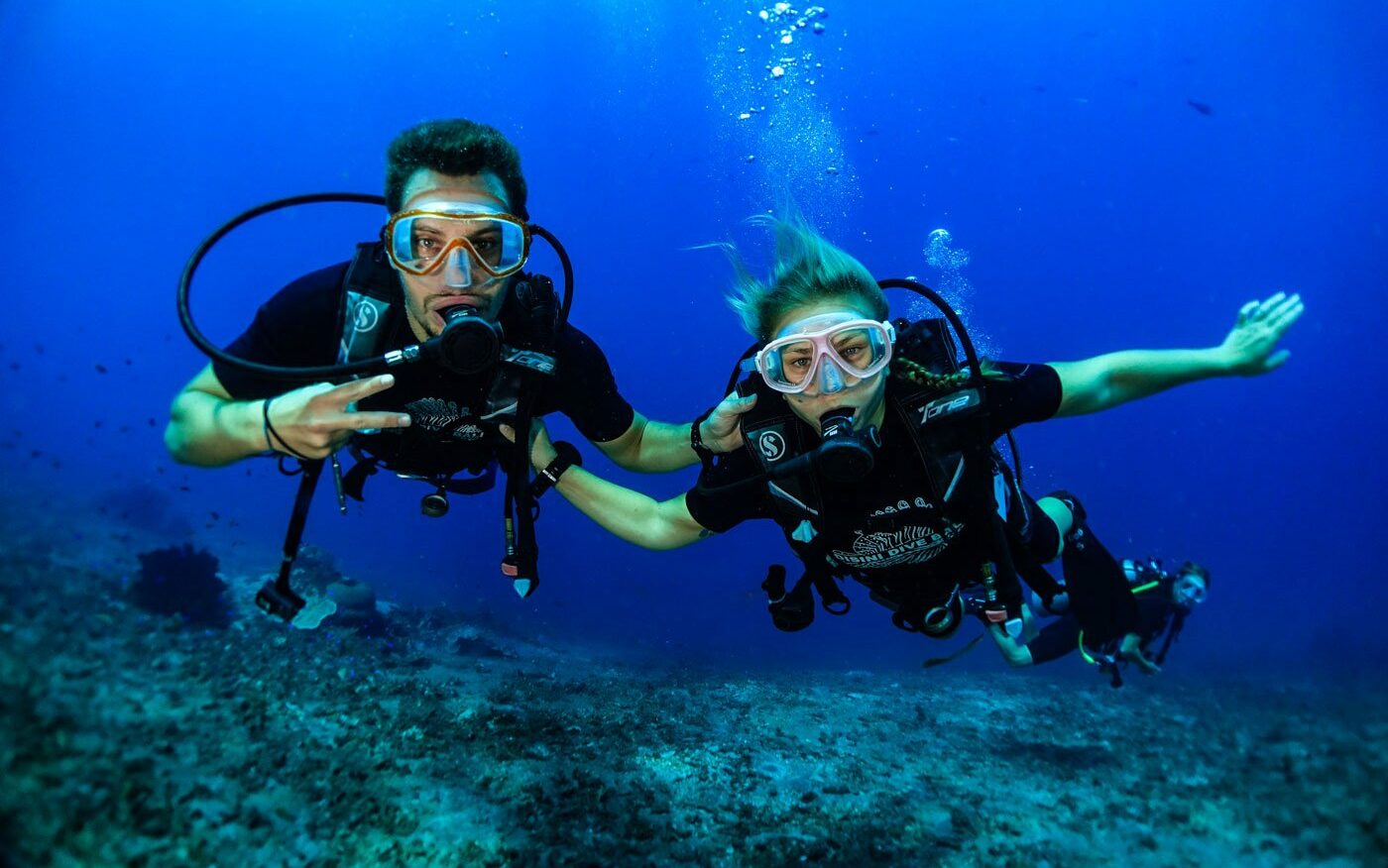Indonesia is a diver’s paradise, boasting some of the world’s most biodiverse marine ecosystems. One of the best ways to explore this underwater wonderland is by embarking on a liveaboard diving adventure. With so many options to choose from, it can be overwhelming to decide which liveaboard is right for you. In this ultimate guide, we’ll take you on a journey through Indonesia’s best diving destinations and help you choose the perfect liveaboard for your next adventure. Get ready to set sail and dive into the beauty of Indonesia!
Why choose a Liveaboard for your diving trip in Indonesia?
How to choose the perfect liveaboard for you ?
It’s time to get ready for your liveaboard adventure, excited?
How to live the diving life at its fullest on a liveaboard?
What does a typical day on a liveaboard looks like?
Be a Responsible and Respectful Diver, Would You?

Why choose a Liveaboard for your diving trip in Indonesia?
Dive resorts, dive safaris or liveaboards, you don’t know which way to turn? In this guide, we will remove any doubts you may have. Discover our 5 good reasons to book a liveaboard:
1 – Get access to remote dive sites
Indonesia is home to some of the world’s most spectacular dive sites, many of which can only be accessed by boat. A few examples: Raja Ampat, Komodo National Park, Banda Sea.
2 – No need to carry around your diving gear
All your dive gear is in one place. You don’t have to worry about packing and carrying your gear every day, as it will stay onboard the vessel. This means less hassle and more time to focus on the diving experience!
3 – A precious time-saver
Get the most out of your diving trip! Diving on a liveaboard is a more immersive experience than diving from land. You can spend more time in the water, explore different dive sites, and see more marine life than on a typical shore-based diving trip.
4 – Take advantage of the crew members expertise
The crew on board spends most of its time sailing aroun Indonesia’s Archipelago. No ones knows the area better than they do! They can provide expert advice on the best diving locations and conditions.
5 – Enjoy a friendly atmosphere
The social atmosphere of a liveaboard can be enjoyable, as you get to meet like-minded divers and share experiences with them. Don’t be shy and talk to other divers, who knows, you might miss out on some great encounters!

How to choose the perfect liveaboard for you ?
There’s no secret! Do some research, read reviews from other divers, and consult with your dive centre or travel agent to find the perfect liveaboard trip for you. It may seem time-consuming, but let met assure you, it’s worth it!
First things firts, find the right trip for your wants & needs by following the 3R’s rules:
- The Right Itinerary: depending on what you want to see and check the seasonality of the destination and the best time to visit to ensure that you get the most out of your liveaboard diving trip. Know that in Indonesia there’s a dry and a rainy season. As the equator line goes through the country horizontally, when it’s the rainy season up north, it means it’s the dry season down south. Not all itineraries can be done throughout the whole year.
- The Right Duration: how many days you can realistically take off work or other commitments taking in account the fact that you cannot take the plane 24 hours after your last dive,not too short for you to enjoy your diving experience as much as possible, and see all the dives spots you wanted to without rushing as you wouldn’t want to do so on vacations. Not too long as diving is exhausting, it would be unnecessary for you to undergo the last dives, especially if you are a beginner.
- The Right Price: from modern liveaboards to traditional ones (phinisi), luxurious and comfortable/adventurous, take a look at the activities available on board (don’t pay for a spa if you’re not interested in it). More importantly, don’t miss out on any of our deals: find our latest liveaboard deals here!
Now that you’re all set, it’s time to find THE right boat for you! Look out for the boat features:
- Boat size and amenities: if you have non-divers in your group, consider itineraries and liveaboards that offer activities such as island excursions, beach visits, snorkelling, and so on.
- The crew experience: if you don’t know the area it’s better to have a local guide that knows the environment and the marine life.
- Safety measures: safety first! You wouldn’t want your dream vacation to turn into a nightmare. Make sure the liveaboard you plan on booking has the right equipment.
- Dive equipment: the quality of the equipment is a top priority for a hassle-free diving experience. According to your speciality, check what the boat has onboard. For instance, if you’re into marine life photography, it would be a huge plus if the liveaboard had a camera room.
It’s a match!
It’s time to get ready for your liveaboard adventure, excited?
Once you’ve done your research and booked your trip, you’ll have to get ready to set sail for adventure! Here’s a list of questions you should ask yourself before leaving:
When should I arrive/leave?
Arrive a day before your first dive: arrive a day before your first dive to allow for adjustment to the time zone and to deal with any travel delays. Moreover, liveaboards trips usually leave in the morning around 11am or 12pm. Better to arrive the day before and find a place to stay near the harbour of departure.
Book your return flight a day after you’re back on land: it is recommended to wait at least 12-24 hours after your last dive before flying to allow your body to safely release any excess nitrogen.
What and how should I pack?
What to pack: even if some boats are pretty spacious, you’ll still have less space for your stuff: pack light and bring only what you need. Check with the liveaboard for any specific packing recommendations. Don’t forget your dive logbook, certification cards, and any medications you may need.
Do I have all the necessary insurance?
Travel & diving insurances: make sure you have travel insurance in case the trip has to be cancelled due to weather conditions, boat maintenance or any other issue. It is strongly recommended to get diving insurance, if you haven’t got one already. Most of the liveaboards do not allow people to dive without one, anyway. Better safe than sorry!
Do I have the right diving certifications?
Check the certifications you may need: make sure you have the necessary certifications for the dive sites you plan to visit. If you need to upgrade your certification, schedule a course well in advance of your trip. Or check if you can do the certification onboard.
Am I able to go scuba diving?
Health: make sure you are in good health and fitness before your trip. Get a medical check-up if necessary and let the liveaboard crew know of any health issues or allergies you may have.
Have you passed the test? Yes? Then you’re ready to go!

Now, relax and live the diving life at its fullest!
You wish! This is not the end of our ultimate guide to a liveaboard. Whether you’re setting sail on a luxury yacht or a budget-friendly vessel, there are a few things you should keep in mind to ensure you have a safe and enjoyable trip. You may already know these, but here are the 5 things you have to keep in mind to get the most out of your liveaboard trip:
- Motion sickness: if you are prone to motion sickness, the struggle is real: bring medication to alleviate symptoms! You can also try to stay on the deck of the boat, where the movement is less noticeable.
- Stay hydrated: drink plenty of water to stay hydrated, especially when you are diving. During a dive, our body loses water through sweating and breathing, and the dry air we breathe in can further dehydrate us. Dehydration can lead to fatigue, cramps, dizziness, and in extreme cases, decompression sickness. Therefore, staying hydrated before, during, and after a dive is crucial to ensure our safety and comfort underwater. It will also prevent you from getting sunstroke! Bring a reusable water bottle to reduce plastic waste and ask the crew for refills.
- Protect your skin: wear sunscreen and a hat to protect your skin from the sun, especially during long days on the boat. Also, bring lightweight, comfortable clothing that covers your arms and legs to protect against sunburn.
- Get enough rest: make sure to get enough sleep to have energy for your dives. Take advantage of the downtime on the boat to relax and unwind.
What does a typical day on a liveaboard look like?
After all that reading, you almost feel like you’re there already? Well, it’s not over yet! Immerse yourself completely in the day on a dive boat. Here’s a sample of what a typical day might look like on a liveaboard:
Wake-up call – Start your day early with a hot cup of coffee or tea before the first dive of the day.
First dive – Jump into the water and explore the underwater world with your fellow divers. Most liveaboards offer at least two dives in the morning, and sometimes even a third.
Breakfast – After a refreshing dive, enjoy a delicious breakfast buffet. Most liveaboards offer a range of options, including western and local cuisine.
Second dive – Get ready for another underwater adventure and discover new dive sites and marine life.
Lunch – After the second dive, recharge your batteries with a hearty lunch. You can chat with other divers, share your experiences, and plan the afternoon activities.
Third dive – Some liveaboards offer a third dive in the afternoon, allowing you to explore different dive sites and perhaps spot new species.
Snacks and relaxation – After the diving activities are over, enjoy some snacks, relax, and soak up the sun on the boat’s deck.
Dinner – Indulge in a delicious dinner buffet, followed by desserts and fruits.
Night dive – For those who want to experience the magic of night diving, some liveaboards offer this unique opportunity.
Relaxation and socializing – After the night dive or dinner, spend time socializing with other divers, reading a book, or watching a movie. It’s important to get enough rest for the next day’s activities.
Bedtime – Hit the sack and get a good night’s sleep before another exciting day of diving on the liveaboard.
Of course, each liveaboard has its own schedule, and the timing and activities can vary depending on the itinerary, weather conditions, and other factors. But this gives you an idea of what a typical day on a liveaboard might look like. Do not hesitate to miss out on a dive if you’re feeling tired or just want to sunbathe on the boat. It would not be worth it, otherwise. You’ll not enjoy it as much.

Be a Responsible and Respectful Diver, Would You?
Being a responsible and respectful diver is essential for protecting the environment and ensuring the safety of oneself and others. By following safe diving practices, properly managing equipment, and respecting marine life and ecosystems, you can help preserve the underwater environment for future generations. Additionally, being a responsible and respectful diver can help promote sustainable tourism and support local communities that depend on healthy marine ecosystems for their livelihoods.
Want to join the light side of the force? Keep on reading to find out how to become a respectful and responsible diver. First of all, all you have to do is follow the basic rules of scuba diving, which are:
- Always check and assemble your equipment before diving.
- Descend and ascend slowly and under control.
- Maintain proper buoyancy control at all times.
- Monitor your air supply and plan your dive accordingly.
- Do not exceed your training and certification limits.
- Always dive with a buddy and communicate regularly.
- Do not touch, take or disturb marine life.
- Leave the underwater environment in the same condition as you found it.
When you embark on a liveaboard diving adventure, you are entering a unique world of exploration, adventure, and luxury. But with great power comes great responsibility. Whether you are an experienced or novice diver, there are certain protocols and guidelines that you must follow to ensure your safety, as well as that of the environment and its inhabitants. While living on and diving from a liveaboard, you should always:
- Follow safety procedures: always listen to your dive guide and follow their instructions.
- Consider the environment: Don’t litter, and if you see any trash, consider picking it up and disposing of it properly.
- Don’t drink too much alcohol: Alcohol and diving don’t mix well.
- Be a good buddy: Look out for your dive buddy and be willing to help them if they need it. If you see someone acting in a dangerous or irresponsible way, speak up and let them know.
If you’ve made it this far, congratulations, you’re a liveaboard expert. All you have to do now is choose one from our selection!



